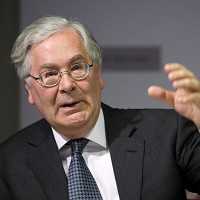 Dr DeAnne Julius, Chairman, Chatham House, and former MPC member
Dr DeAnne Julius, Chairman, Chatham House, and former MPC member
An unseemly turf battle broke out at the Mansion House last week over who should be in charge of spotting and squelching future threats to financial stability: the Bank of England or the Financial Services Authority. Neither the Bank nor the FSA covered itself with glory in the early stages of the current crisis. Both are secretive organizations with hierarchical decision-making. Such a culture works well for handling confidential information but it does not foster open debate or the early recognition of external change.
I propose that the Bank’s Monetary Policy Committee be given the task of promoting medium-term financial stability. In addition to its current remit of targeting inflation by setting interest rates, it would need an additional instrument, outlined below. It would also need an adjusted membership and monthly process. But fundamentally it has the expertise and governance structures to take on this new role – and would have significant advantages over either the FSA or the Bank’s internal bureaucracy. Putting a re-shaped MPC at the centre of the tripartite arrangement for preventing future financial crises would also add cohesion and coherence to crisis resolution – led by the Treasury – should that need arise.
The MPC, with its independent external membership, its published minutes, its transparent votes and its good track record in controlling inflation is well suited to make judgments about the build-up of systemic risks in the economy. It already monitors household debt, asset price changes, financial market spreads and money and credit aggregates. These are important indicators of financial stability. In addition, the FSA could provide the MPC with aggregate data on financial institutions such as borrowing ratios and liquidity mismatch.
The membership of the MPC should be adjusted for the new task. The governor of the Bank should remain chairman but two of the four internal Bank members should be replaced with two FSA members, including either the FSA chairman or chief executive. And at least one of the four external MPC members should have financial market experience. External members might also need to be full time, rather than working three days a week, to handle the extra workload.
At every third monthly meeting, the MPC would give special attention to financial stability concerns – with pre-meeting briefings from FSA staff – and it would decide if a change were warranted in the target capital adequacy ratio of UK-regulated banks and other financial institutions. The lower bound of this ratio, the amount of capital that must be held, is set internationally by the Basel II agreement, but subject to that minimum the MPC would decide if it should be adjusted for UK institutions in accordance with our economic cycle. A change in the capital adequacy target announced by the MPC would become a regulatory requirement three months later, giving banks time to adjust. The aim would be for gradual movements in bank capital to provide a cushion that would be built up in good times and available in downturns, similar to the Spanish system.
During the adjustment period, the FSA staff would work with individual institutions to determine whether other changes in their leverage or funding profiles were also warranted. The FSA would continue to have sole responsibility for the regulation of financial institutions and products, such as mortgages and insurance. So, for example, the FSA could decide to impose maximum loan-to-value ratios on mortgages to complement a decision by the MPC to raise the aggregate capital adequacy ratio.
The Treasury is the third leg of the stool of financial stability. It would continue to send a non-voting representative to MPC meetings, thereby ensuring frequent and substantive tripartite communication. If, despite this new system of regular monitoring and action on capital requirements, a banking crisis should arise, then the Treasury would take the lead as crisis manager to convene meetings and decide what risk the taxpayer should bear. But for crisis prevention, a non-political MPC, with clear lines of responsibility, transparent procedures, and the best internal and external expertise available would be a major improvement over the current arrangements, where responsibility is muddled and false demarcation lines between monetary and financial stability have created dangerous gaps.
The Chatham House


